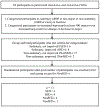A qualitative investigation of activity measurement and change following a mind-body activity program for chronic pain
- PMID: 33971485
- PMCID: PMC8328925
- DOI: 10.1016/j.ctcp.2021.101410
A qualitative investigation of activity measurement and change following a mind-body activity program for chronic pain
Abstract
Increasing activity is important yet challenging among people with chronic pain. Objective assessment of activity using accelerometers (i.e., ActiGraph) has gained popularity, but reactivity to assessment and non-adherence to wearing the ActiGraph may bias data. We explored: 1) experiences of wearing the ActiGraph to identify ways to increase adherence and facilitate accurate assessment of activity; and 2) barriers and facilitators to increasing activity following two mind-body activity programs to optimize future interventions. We conducted semi-structured exit interviews with 13 participants with heterogenous chronic pain who completed a randomized controlled trial of two mind-body activity programs. We analyzed transcripts using a framework approach to generate themes. Participants indicated that receiving reminders increased ActiGraph wear adherence and reported that program skills such as gratitude, pacing, mindfulness, and deep breathing were facilitators to increasing activity, while medical problems were barriers. Interventions aiming to increase activity may benefit from emphasizing mind-body skills and sending ActiGraph wear reminders.
Keywords: ActiGraph; Chronic pain; Mind-body; Physical function.
Copyright © 2021 Elsevier Ltd. All rights reserved.
References
-
- Greenberg J, Lin A, Zale EL, Kulich RJ, James P, Millstein RA, Shapiro H, Schatman ME, Edwards RR, Vranceanu A-M, Development And Early Feasibility Testing Of A Mind-Body Physical Activity Program For Patients With Heterogeneous Chronic Pain; The GetActive Study, J Pain Res. 12 (2019) 3279–3297. 10.2147/JPR.S222448. - DOI - PMC - PubMed
-
- Greenberg J, Popok PJ, Lin A, Kulich RJ, James P, Macklin EA, Millstein RA, Edwards RR, Vranceanu A-M, A Mind-Body Physical Activity Program for Chronic Pain With or Without a Digital Monitoring Device: Proof-of-Concept Feasibility Randomized Controlled Trial, JMIR Form Res. 4 (2020) e18703. 10.2196/18703. - DOI - PMC - PubMed
MeSH terms
Grants and funding
LinkOut - more resources
Full Text Sources
Other Literature Sources
Medical


